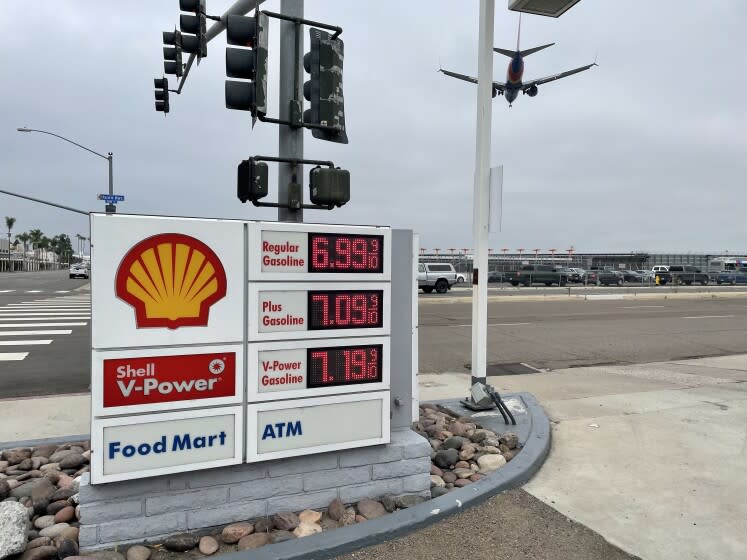Deal reached on plan for more than $9 billion in gas refunds to California drivers

Gov. Gavin Newsom and state lawmakers have reached a tentative deal to send $9.5 billion in tax refunds to Californians, providing as much as $1,050 to families this fall in long-awaited financial relief from record-high gasoline prices and other rising costs.
The plan would provide larger refunds to households that earn less money and include an additional payment for dependents, according to documents outlining the proposal.
Though Newsom originally hoped to get money back in people's pockets this summer, discord among Democrats at the state Capitol delayed the timeline for months. Refunds to offset the highest fuel costs of any state in the nation will probably not start going out until October if approved by the Legislature next week.
The plan to issue refunds is part of a larger state budget agreement the governor and legislators are expected to announce soon. The spending plan for the upcoming year includes more funding for K-12 education, COVID-19 bonuses for healthcare workers, money to address drought and wildfire, expanded access to abortion services and other funding priorities of California's Democratic leaders.
Defraying rising gas prices has been at the crux of the debate between Newsom and lawmakers over how to spend the state's surplus tax revenues, last projected to reach $97 billion through next summer. The sides disagreed for months over who should receive refunds and how much they should get.
Newsom ultimately gave up his effort to tie refunds to vehicle ownership through the Department of Motor Vehicles and agreed with a legislative plan to work with the Franchise Tax Board to send direct deposits and debit cards to taxpayers. Leaders of the Senate and Assembly compromised on their call to exclude wealthy Californians from being eligible for refunds and settled on an income cap of $250,000 for individual taxpayers and $500,000 for joint filers — more than double the limit in their original proposal.
The plan would provide refunds on a sliding scale based on three income levels.
An individual who earns up to $75,000 a year would receive a $350 refund, which would double to $700 for joint filers earning as much as $150,000. Households would receive an additional $350 payment if they claimed any dependents, for a maximum refund of $1,050.
At the next income level, single filers who earn up to $125,000 would get $250 refunds. Households that file jointly and earn up to $250,000 would receive $500. Children or any other dependents would qualify taxpayers for an additional $250 payment, making families in the income bracket eligible for as much as $750 total.
Individuals who earn up to $250,000 would receive $200, and joint filers with income of as much as $500,000 would receive $400. Households with dependents would receive an extra $200, making this income bracket eligible for a maximum of $600.
The Legislature will vote on refunds and a final state budget plan in a series of bills next week.
Last week lawmakers sent Newsom a preliminary state budget plan totaling more than $300 billion, a framework that included their initial proposal to provide $8 billion in tax refunds.
Lawmakers passed the preliminary budget in order to meet a constitutional deadline of June 15 to avoid forfeiture of their paychecks. But they had not landed a deal with the governor on rebates or the spending plan and expected many details to change this week.
Under the new agreement, money for refunds would increase by $1.5 billion above the Legislature's initial plan.
The governor outlined an $11-billion proposal in March to give rebates to drivers. Legislators offered various ideas that cost less than Newsom's plan, with many lawmakers wanting to direct more state funding to infrastructure projects and improvements in their districts.
The efforts to lessen the sting of gasoline prices also lands in the middle of an election year and at a time when inflation and interest rates are on the rise, elevating concerns about a recession.
Californians paid an average of $6.34 for a gallon of regular unleaded gasoline as of Friday, according to the American Automobile Assn. The state average dropped slightly from a record-high last week but remains $1.42 above the national average.
The deal on refunds comes after President Biden asked Congress to approve a gas tax holiday through September, suspending the federal gas tax in an effort to bring down gas prices by 18 cent a gallon across the nation. Biden also called on states to similarly suspend fuel taxes to further reduce prices.
Republican legislators in California have repeatedly criticized Democrats for failing to take swift action to reduce the cost of gasoline and for rebuffing GOP calls to suspend the state's 51-cent-a-gallon excise tax on fuel.
Assembly Speaker Anthony Rendon (D-Lakewood) announced a legislative inquiry Monday to determine whether oil companies are “ripping off” drivers. The Democratic leader said he would appoint a select committee to determine steps the state can take to reduce gas prices, looking beyond just rebates.
The select committee’s inquiry follows an earlier investigation Newsom asked the California Energy Commission to conduct in 2019 that found big corporate gas stations charge “higher prices for what appears to be the same product” and raised the possibility that competing oil companies were illegally price-fixing.
This story originally appeared in Los Angeles Times.

 Yahoo Movies
Yahoo Movies 
